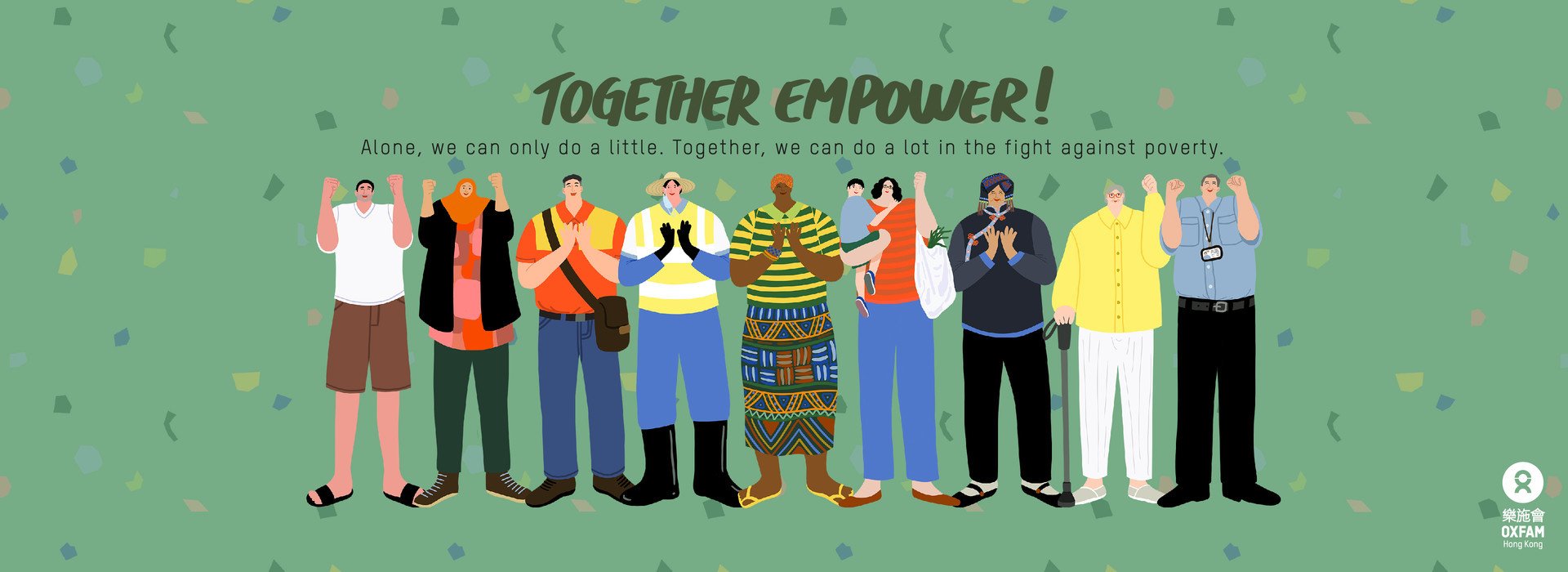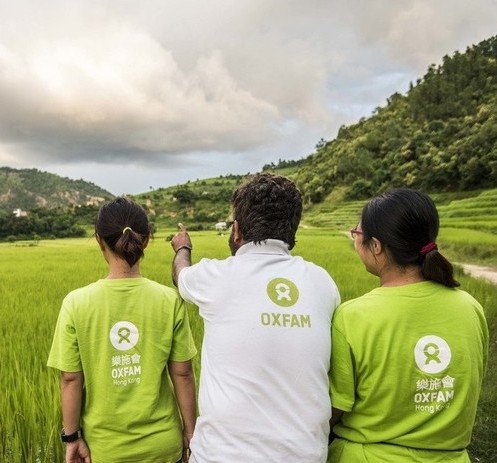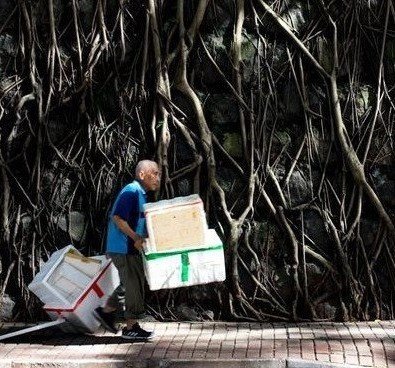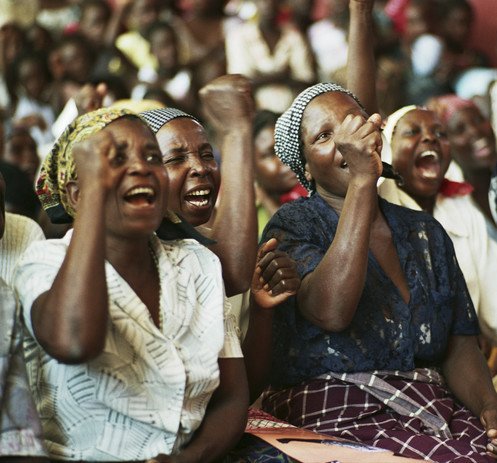Main Pageempowerment marketour partnersAudio StoriesCorporate Supportdonate
There’s more to poverty than meets the eye. That’s why we’re inviting the public to rethink it on 17 October – the International Day for the Eradication of Poverty – and beyond, and to fight it with us.
In 2021, Oxfam put together four stories about poverty with StoryTeller. These stories, based on real events, are narrated by singer-songwriter Terence Lam Ka Him; Commercial Radio DJ Amber Au, who’s passionate about social issues; climate-conscious singer-songwriter Manson Cheung; and angelically voiced singer Cloud Wan. Together, we’re hoping to reveal the everyday realities of poverty.
Listen to stories below to walk in the shoes of those in poverty, and let’s look at the data and let the stats show us what poverty looks like around the world.
#RethinkPoverty ep1: Street Sweeper
(Narrated by Terence Lam)
'Many believe that poverty is hunger and homelessness. But there are many different kinds of poverty. Poverty can even make you experience the heat more intensely than those who are well-off.'
#RethinkPoverty ep1: Street Sweeper
Although he’s worked as a street sweeper for quite some time, Mr Chan still hasn’t quite gotten used to working in extreme heat. It’s about 36°C today, a record-breaking new high this month.
He’s wearing a stifling blue uniform. Drenched in sweat, he finishes sweeping a street before pushing his cart onto the next one.
It’s gotten hotter and hotter these few years. His fellow coworkers suffer from heat stroke every now and then and have to see a doctor. ‘You’ll get used to it,’ they always say. But it’s really difficult to get used to such hot weather.
The stuffy uniform is bad enough, but what’s worse is the limited access to water. Street sweepers have to go to refuse depots to refill their water bottles. But these depots only have kettles and no drinking water; they have to boil water themselves.
If they don’t want to drink piping hot water in the scorching heat, they have to bring their own. That’s why many street sweepers bring huge bottles of water to work. Carrying heavy water bottles to work is better than having no water to drink.
They don’t have water breaks either. At least not in the open – the same goes for lunch. If they want to drink water, they have to drink it discreetly so no one sees.
Once, a fellow street sweeper was caught drinking water. Somebody lodged a complaint, and he found himself in deep trouble. Mr Chan sometimes wonders why he should have to worry about drinking water. He’s human after all.
In the blink of an eye, he’s finished the two bottles of water he brought. The refuse depot is very far away, going back to boil water just wouldn’t make sense. He can’t afford to buy another bottle of water though. He’s already cutting back on expenses by doing things like keeping his air con off so he can lower his electricity bill. Just turning on the fan is expensive enough.
Even though he feels dizzy and light-headed, he tells himself to bear with it and continues to clean the streets. When he can’t take it anymore, like today, Mr Chan would sit at the doorway of an old building, hoping he’d be fine after resting for a while.
No sooner had he plopped himself down than a security guard emerged from the building. Mr Chan thought he was going to shoo him away. So, with the little strength he had left, he got up with the help of his broom. To his surprise, the security guard brought him a bottle of water and said: ‘It’s really hot today. Here’s a bottle of water for you.’
Many would say Hong Kong is a very hot place, but the people here are cold. However, there are exceptions.
Accepting the kind and timely gift, he unscrewed the cap, took a sip, and smiled at the security guard, thanking him from the bottom of his heart.
Many believe that poverty is hunger and homelessness. But there are many different kinds of poverty. Poverty can even make you experience the heat more intensely than those who are well-off.
Mr Chan believes that if everyone in this city would think of others first, be more considerate and put themselves in others’ shoes more often, life would be much better, wouldn’t it?
[End]
#RethinkPoverty ep2: A Security Guard and a Tomato
(Narrated by Amber Au)
'Many believe that poverty is synonymous with starvation. But there are many different kinds of poverty. Poverty doesn’t have to mean you’re starving – it could mean you’re malnourished.'
#RethinkPoverty ep2: A Security Guard and a Tomato
As a security guard, when you see someone who has no business being on the property you’re patrolling, your duty is to shoo him away.
But Mr Wong recognises the man who’s ‘trespassing’ – he’s the street sweeper of this neighbourhood. ‘He’s just taking a rest because he can’t stand the heat today,’ Mr Wong said to himself. So, walking over to the fridge and grabbing his own bottle of water, he handed it to the street sweeper and said:
‘It’s really hot today. Here’s a bottle of water for you.’
The pandemic had cost Mr Wong his job; he was a chef prior to that. He lives in a subdivided flat in Tuen Mun with his family. As the sole breadwinner, he has to provide for his wife, son and younger brother, who has a chronic illness.
Unemployed, Mr Wong started furthering his education, learning how to make dim sum and bread; he even got his security personnel permit. After months of searching, he finally landed a job as a security guard.
On a typical weekday, he goes home straight after work. But today is not an ordinary day; he needs to bring his son to Sham Shui Po to see a nutritionist.
When Mr Wong was a chef, everyone had nothing but compliments for his food. But his son only likes tomatoes, nothing else. He has never praised or appreciated his dad’s cooking. As his dad, it breaks Mr Wong’s heart to see his son so skinny and underweight.
Mr Wong later discovered a community centre that provides free nutritionist consultations for children from working-class families. Although it takes an hour to get there, he’s determined to bring his son there.
When he got there, he realised that there were a lot of other kids like his son who were picky eaters. Some only ate chicken wings and eggs, while some only ate plain rice mixed with soy sauce. Some parents also shared that they didn’t know how to help their kids maintain a balanced diet, that’s why their children were either under- or overweight.
The nutritionist told Mr Wong that it wasn’t bad that his son liked eating tomatoes. Instead, she suggested cooking dishes that had tomatoes in them. Shrimp, tomatoes and rice made with a rice cooker, for instance. If his son wanted soup, he could try making tomato, zucchini and egg drop soup with pork, as it contains a lot of necessary nutrients. Having taken this advice, Mr Wong’s son now finishes everything on his plate and it’s taken a weight off Mr Wong’s shoulders. Who would’ve known adding something as simple as a tomato to other dishes could have such a big impact.
Many believe that poverty is synonymous with starvation. But there are many different kinds of poverty. Poverty doesn’t have to mean you’re starving – it could mean you’re malnourished.
If they know that their children like to eat, most parents would do anything to give their children the best food they have. The problem is that many parents from working-class families don’t always know what constitutes a balanced diet. And naturally, they don’t know what to do with picky eaters.
Now, armed with a better understanding of nutrition, Mr Wong can breathe a sigh of relief. He’s even heard his son say something he’s been longing to hear: ‘Dad, what you cooked was amazing!’
[End]
Oxfam's Nutrition Support Project for Low-Income Families
#RethinkPoverty ep3: A Farmer and His Seed Bank
(Narrated by Manson Cheung)
'Many believe that poverty is synonymous with hunger and homelessness. But there are many different kinds of poverty. You could own land and work very hard to grow crops, but you could still be left with nothing because of climate change.'
#RethinkPoverty ep3: A Farmer and His Seed Bank
Mr. Ho was born into a family of farmers in a small village in Guangxi. For generations, his family has been farming everything from beans to rice to tomatoes.
The past few years have been exceptionally hot though. There have even been prolonged periods of drought. In the rare event that it does rain, it rains too much. Their crops are victims of extreme weather: they either wither under the scorching sun or are washed away by rainstorms.
Mr. Ho gave up his job in the city to be a farmer. He brought what he had learnt about sales and marketing back to his hometown and established the ‘Community Seed Bank’ there.
Without the seed bank, farmers would only be able to plant their own seeds. If a change in weather makes it difficult to grow a certain type of crop, they would have poor harvests that year. Now with the seed bank, farmers and villages can exchange seeds to improve crop varieties and yields. The power of one person is limited. It is only by working with other farmers and villagers that farming can be sustainable and beneficial for everyone.
Many believe that poverty is synonymous with hunger and homelessness. But there are many different kinds of poverty. You could own land and work very hard to grow crops, but you could still be left with nothing because of climate change.
Several people have come to the village to learn a thing or two about farming from Mr. Ho. Like Miss Chan. Miss Chan is a social worker from Hong Kong. Her favourite pastime is gardening; she occasionally helps out at a farm during the holidays. After hearing that someone had established a seed bank in Guangxi, she travelled there to learn about it.
Mr. Ho was delighted to meet his guests because he could finally share how he established the seed bank with other people.
He knows that seed banks are not the most conventional approach to farming in the country. A lot of people would rather choose the easiest and fastest way to grow crops by using pesticides, chemical fertilizers and commercial seeds, but these are bad for the environment. Overreliance on pesticides and chemical fertilizers could even exacerbate climate change.
Miss Chan loves tomatoes and was given some that Mr. Ho had grown. Biting into one, she noticed how incredibly sweet and juicy it was; her face said it all – she definitely enjoyed the tomato! She even wanted to take some seeds back to Hong Kong so she could grow some of her own.
Mr. Ho couldn’t hold back his smile as he began to imagine the looks on the faces of children in Hong Kong. He was sure they would light up just like Miss Chan after eating these tomatoes.
It was then that he realised that even though the power of one person may seem small, as long as you are willing to share what you believe in, your beliefs can spread to the wider community.
#RethinkPoverty ep4: A Phone in Africa
(Narrated by Cloud Wan)
'Mobile phones have become a necessity in today’s age. Even if a person has one today, it does not mean that that person is rich. Without a mobile phone, people living in poverty would be cut off from the rest of the world, find it difficult to thrive or even escape poverty.'
#RethinkPoverty ep4: A Phone in Africa
After leaving the small village in Guangxi, Miss Chan made her way to Tanzania, Africa – one of the least-developed countries in the world.
Her destination was a village far from the city; Miss Chan was mentally prepared, or so she thought.
The first thing she noticed was that most villagers had a mobile phone. Can’t blame her for thinking that they aren’t that poor.
Looking a little closer at their phones though, she realised that they were holding old models. The shoes they were wearing were no better.
It turns out that mobile phones are an important tool for people in countries across Africa. Many would rather have a mobile phone than a pair of shoes because that’s the only way to stay connected to the world, and access news and information. This is especially crucial because the weather has become unpredictable thanks to climate change.
Farmers in the continent cannot afford to wait around and decide whether or not to work in the fields by merely looking at the sky. Droughts and infestations could strike at any time. That is why information about the weather is very important for farmers.
With a phone, farmers can learn more about natural disasters, prevent future disasters from damaging their crops by deciding when to plant seeds and harvest crops, and increase crop yields.
Without this information though, farmers could lose all of their savings to a single drought, and leave their families on the brink of starvation.
Aside from climate change, the distance from their village to the city is another challenge as it makes it difficult for farmers to buy and sell produce in markets.
In a world where information is unevenly distributed and access is limited, farmers experiencing poverty are almost always placed at a disadvantage.
In poor villages, even if one or two villagers have a mobile phone, the whole village can obtain important information about disaster prevention and the prices of various crops. This in turn could improve the lives of farmers living in poverty.
In the past, many traditionally believed that poverty looked like hunger and homelessness. But as society evolves, poverty has evolved with it.
Mobile phones have become a necessity in today’s age. Even if a person has one today, it does not mean that that person is rich. Without a mobile phone, people living in poverty would be cut off from the rest of the world, find it difficult to thrive or even escape poverty.
The next morning, a woman from the village approached Miss Chan while holding her phone. She wanted to add Miss Chan as a friend on Facebook. Miss Chan happily took out her phone and accepted her friend request.
Now, back in Hong Kong, Miss Chan still checks to see what’s new with her friend from Tanzania from time to time. Although she doesn’t share updates regularly, every time Miss Chan sees a photo of her Tanzanian friend, she’s reminded of how this world is both very big and incredibly small all at the same time.
[End]




